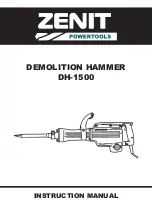
12
PROCEDURE
q
Depress the contact arm.
w
Pull the trigger.
SINGLE FIRE OPERATION (ANTI-DOUBLE FIRE MECHANISM)
For single fire operation, depress the contact arm against the work surface and pull the trigger. Tool can
not fire a second nail until the trigger is released and tool can cycle.
SEQUENTIAL TRIP
The Sequential Trip requires the operator to hold the tool against the work before pulling the trigger. This
makes accurate fastener placement easier, for instance on framing, toe nailing and crating applications.
The Sequential Trip allows exact fastener location without the possibility of driving a second fastener
on recoil, as described under “Contact Trip”.
The Sequential Trip Tool has a positive safety advantage because it will not accidentally drive a
fastener if the tool is contacted against the work-or anything else-while the operator is holding the
trigger pulled.
SEQUENTIAL TRIP
Identified by
ORANGE TRIGGER
.
MODEL IDENTIFICATION
CONTACT TRIP
The common operating procedure on “Contact Trip” tools is for the operator to contact the work to
actuate the trip mechanism while keeping the trigger pulled, thus driving a fastener each time the work
is contacted. This will allow rapid fastener placement on many jobs, such as sheathing, decking and
pallet assembly.
All pneumatic tools are subject to recoil when driving fasteners. The tool may bounce, releasing the trip,
and if unintentionally allowed to recontact the work surface with the trigger still actuated (finger still
holding trigger pulled) an unwanted second fastener will be driven.
CONTACT TRIP (CN565D)
Identified by
BLACK TRIGGER
.
CONTACT TRIP WITH ANTI-DOUBLE FIRE MECHANISM (CN565S)
(US patent 5597106, UK patent 2286790)
Identified by
RED TRIGGER
.

































